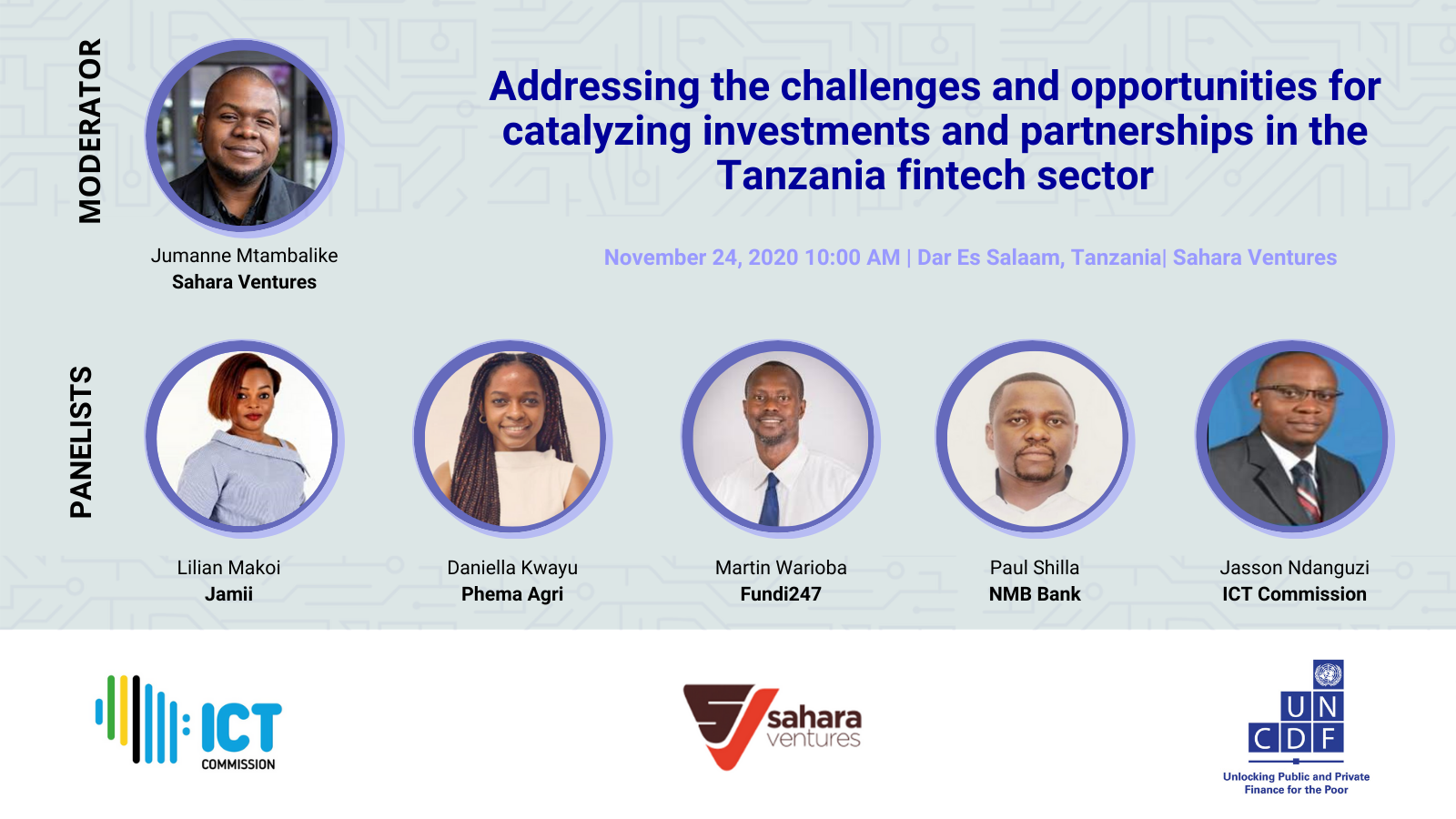Catalysing Investments and Partnerships for Fintechs in Tanzania
Tags

Speakers at the workshop on 24 November 2020
Tanzania’s fintech ecosystem has changed significantly over the last decade.
Early entrants into the fintech space, mobile money operators (Airtel, Tigo, and Vodacom) have since matured and achieved scale. In their place, a new wave of fintech start-ups have emerged in Tanzania, working alongside the incumbents and other service providers in the market, to address the financial inclusion needs of Tanzanians. Coupled with the challenges of attracting investments, some Tanzanian fintech start-ups face difficulty in sourcing the right talent and navigating regulatory requirements.
In line with its new digital strategy ‘Leaving No One Behind in the Digital Era’, the United Nations Capital Development Fund (UNCDF) partnered with Tanzania’s Information, Communication and Technology (ICT) Commission and Sahara Ventures, one of the leading innovation hubs in Tanzania, to conduct a comprehensive assessment of the Tanzanian fintech landscape.
The initial assessment identified 34 active fintech start-ups focusing on the following market segments – payments and remittances, lending and financing, insurance, savings, investments, and personal finance. Only 12 per cent of these startups are at the growth stage of their development. The majority, 68 per cent, are in their early stages while 20 per cent are still at the pre-startup stage and are yet to launch fully. In addition, a large portion (91 per cent) of the start-ups are core fintech companies that provide financial services directly to end users, either consumers or businesses. The remaining 9 per cent are enabling fintech companies that provide technology solutions primarily to financial institutions to enable the delivery of financial services.
The segmentation of Tanzania’s fintech startups highlights the gaps that need to be addressed to accelerate the growth of the fintech sector. Some of the sector’s growth inhibitors indicated by the assessment include a fragmented funding ecosystem that requires start-ups to invest a lot of time and effort to attract limited funding, a lack of affordable and skilled local talent, and low levels of financial and digital literacy among Tanzanian adults, particularly those in rural areas.
Nevertheless, Tanzania’s economic and financial progress provides ideal conditions for emerging innovations and a perfect ecosystem for advancing digital finance. According to the Tanzania Finscope report (2017), over 75 per cent of Tanzania’s population have mobile phones and more than 60 per cent of them have a mobile money account. Tanzania was the first African country to introduce mobile money interoperability which has significantly widened access and competition for digital financial services.
With a growing pool of Tanzania-based investment actors, the market is also becoming increasingly attractive to funders from other African countries and international investors.
Following the assessment, UNCDF, the ICT Commission, and Sahara Ventures are hosting a workshop on 24th November 2020, to validate the findings of the assessment. The validation workshop will enable key stakeholders in Tanzania’s financial services ecosystem including regulators, donors, financial institutions, fintech startups and startup accelerators to discuss the key determinants of fintech growth such as technical skills, access to capital and the policy and regulatory environment.
Working together, workshop participants will co-create solutions that could potentially address the challenges highlighted during the assessment. Based on the outcome of these discussions, UNCDF will refine and adopt one or more of the initiatives presented, in partnership with key stakeholders, to accelerate the growth of the Tanzanian fintech ecosystem.
“Currently, information on the Tanzanian fintech segment is fragmented and incomplete. By undertaking the fintech landscape assessment and creating a central repository of fintech startups, UNCDF aims to fill a vital information gap in the market that may improve potential investors’ understanding of the sector, including the challenges and opportunities for accelerating the growth of the fintech sector to meet the financial inclusion needs of Tanzanians.” -Ivana Damjanov, UNCDF Regional Programme Specialist, Inclusive Digital Economies.
UNCDF makes public and private finance work for the poor in the world’s 47 least developed countries. With its capital mandate and instruments, UNCDF offers “last mile” finance models that unlock public and private resources, especially at the domestic level, to reduce poverty and support local economic development.
UNCDF has formulated its strategy ‘Leaving no one behind in the digital era’ based on over a decade of experience in digital finance in Africa, Asia and the Pacific. UNCDF recognizes that reaching the full potential of digital financial inclusion in support of the Sustainable Development Goals aligns with the vision of promoting and financing digital economies that leave no one behind. The vision of UNCDF is to empower millions of people by 2024 to use services daily that leverage innovation and technology and contribute to the Sustainable Development Goals.